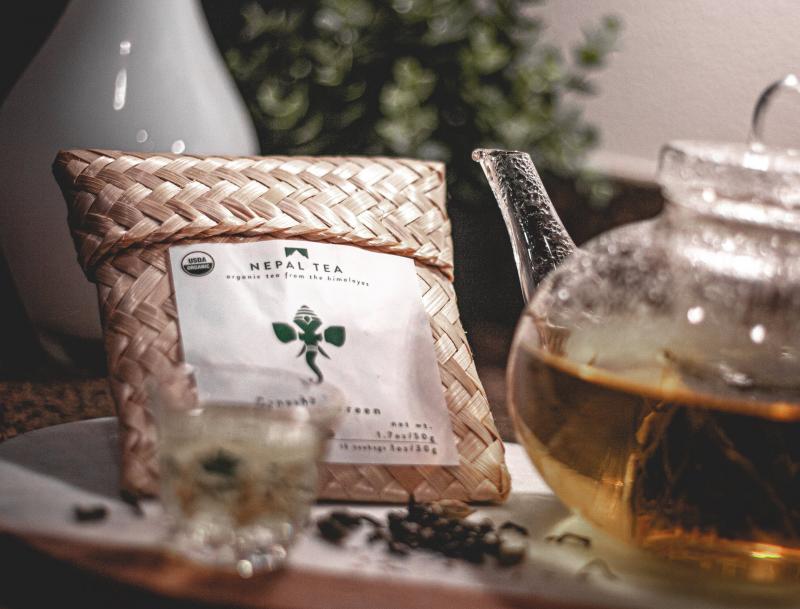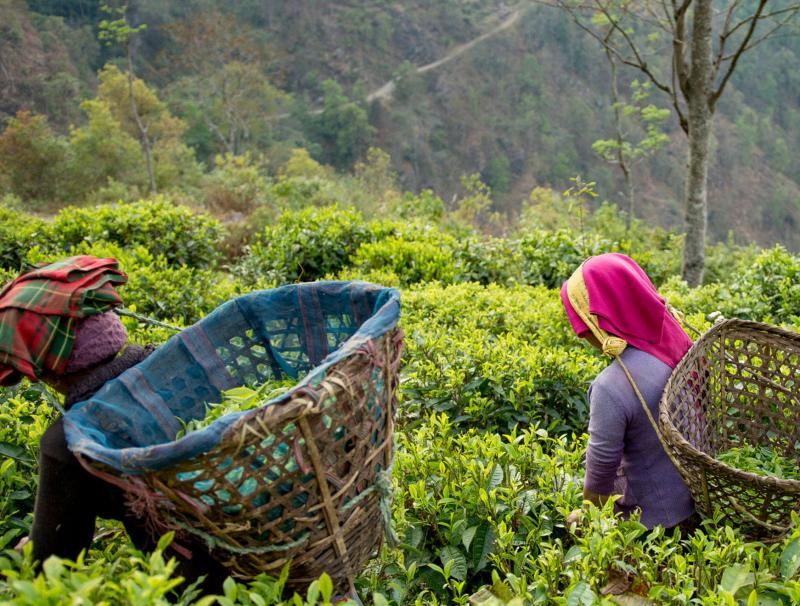Nepal Tea is a social enterprise that distributes certified organic teas from Nepal while uplifting the livelihoods of the farmers and empowering their second generations through educational scholarships.
The company’s vision is to bridge the ever-widening gap between the primary producers and the ultimate consumers and create an ethically sustainable supply chain.
Over the course of the COVID-19 pandemic, the global crisis has brought about a lot of changes for Nepal Tea, but the business has been resilient enough to grow and expand during that time. According to a statement on their website, the company says, “We got back to our roots, managed our farm through zoom and google meet, started farmers' emergency fund, opened new office and warehouse in Long Island City, N.Y., and of course provided our dear customers with all the teas that they wanted directly at their doorstep.”

World Tea News chats with Nishchal Banskota, founder of Nepal Tea, to learn more about his deep family roots in tea, how his company supports its farmers, and what makes Nepal Tea special. Banskota will also speak at the World Tea Conference + Expo 2022 in Las Vegas on Tuesday, March 22 from 9:45 to 10:45 a.m. His session will look at the do's and don'ts of importing and exporting tea.
Question: You have deep roots within your family in tea. How has your personal life/love of tea led you to create Nepal Tea?
Answer: Tea has not just been a beverage for our family but really a catalyst for social change for our village that I was born in. My visionary father was the one who saw the dream and jointly with my mother sowed the seeds of hope (tea plant) in their backyard in the early ‘80s, which has now become a farm that supports more than 200 farmers. [For Reference: Here’s a detailed story about Banskota’s father and how he got started. And here’s a detailed story about Banskota’s personal journey and a small timeline of events.]
As I immersed myself into the tea world, I soon realized that some of the problems were pretty global and not just tied to the Nepali Tea Industry. For instance, the gap between the producers and the consumers is ever widening; consumers rarely know where their teas are coming from or when it was actually harvested. Similarly, the tea merchants all over the world were making millions while the smallholder tea farmers were living under $2 a day. This really bothered me, and I wanted to take a shot at changing that in our own small ways. To tackle this specific problem and also the problem of suppressed identity of Nepali Teas in general, I came back to the U.S. in 2016 and started Nepal Tea with two core missions. One, to create an identity of Nepal Tea and really market the geography, origin and its uniqueness in the tea world. Two, to bridge the gap between the primary producers and the ultimate consumers eventually with a vision to get one million farmers out of poverty within their generation and within my lifetime.

Question: Tell me more about how you support your farmers.
Answer: Our farm was established in 1984 with the clear mission of getting the community out of poverty and I have seen first-hand after 37 years, how much has the village transformed because of this single leaf. The few things that we do in our farm are free community housing for all the full-time farmers that cannot afford one, scholarships for all the full-time farmers' children. We have distributed around 2,400 scholarships to date from the farm along with the support from our tea buyers. We have more than 40 success stories of students that have received scholarships for more than 10 years and now have gone to improve not just their own but their family’s economic and social living standards.
Similarly, we have a cooperative established for the farmers that does small-scale micro financing. The farmers are the owners of the cooperative itself and the coop buys daily necessities – such as rice, salt and oil – on a wholesale basis and distributes them to the farmers, which allows the farmers to get these daily essentials at a subsidized price. Furthermore, we have a cow-bank project, where we distribute cows for our farmers for extra income. We donate cows/buffalos to the farmers, and they can sell their dairy products directly into the market for extra income. We as a factory buy the cow dung, which is an additional form of income for the farmers.
During the pandemic we were able to create a farmer’s emergency fund that raised funds to support the farmers financially in case they contract COVID-19 and/or to cover lost wages in case of lockdowns.
We extended our scholarship program to not just tea farmers' children but to anyone in Nepal who is unable to get quality education due to financial difficulties. Therefore, we had a small goal of matching 21 students to 21 donors to fund their education in 2021, and we are proud to say that we have already reached that goal of 21 students. We are now doubling that goal to 42 students for 2021. Anyone can become a sponsor for $11 per month. [Reference: For more information, visit NepalTeaFoundation.org/education.]

Question: Take me on a journey from leaf to cup – what makes Nepal Tea unique?
Answer: The journey of the tea leaf is mostly similar to any other tea producing country. However, what makes Nepali tea unique are the factors that play into the natural characteristics of the tea and the people and expertise that they have in crafting artisanal tea.
It all starts with the microclimate of the regions in Nepal. The tea bushes – mostly Chinese varietals and some Assamica – sit on the laps of the foothills of the third highest mountain, Mt. Kanchenjunga and other Himalayas; they are the bedrocks of some of the freshest and unique teas. The altitude, fresh winds from the Himalayas, unpolluted environment all goes into the mix along with the opposite direction winds from Bay of Bengal. All of this is a perfect recipe for quite a volatile micro-climate of the region.
While it may sound counterintuitive, the volatile microclimate actually allows the tea bushes to make flavonoid compounds as part of their defense mechanism and to relieve stress during this volatile environment. These compounds are generally responsible for the unique flavors in the tea from the region. Furthermore, the tea bushes are quite young compared to the other regions in the world, which further adds to the freshness and floral characteristics of any tea produced in Nepal.
Question: Thanks for your time! Last question: How does Nepal Tea support sustainable efforts? I saw some of the tea pouches use local bamboo, is this an example of sustainability?
Answer: Environmental sustainability has always been at the core of our tea production and consumption. We are constantly navigating and trying to balance social and environmental sustainability with business viability. First and foremost, all our teas currently are certified organic that support the environment in a natural way. We are navigating to work towards biodynamic farming taking inspiration from the great Makaibari Tea Estate itself. We are also working on getting electric dryers that will be run on hydropower, to take a step further in producing teas in a more sustainable way rather than burning firewood or coal.
In our marketing efforts, we are using bamboo packaging which has both social and environmental benefits. We empower and train farmers and other locals to weave the bamboo that provides financial support and, in some cases, creates full employment for the artisans. On the environmental side, it is a biodegradable source of packaging that helps us in amplifying our sustainability efforts.
To learn more about Nepal Tea, visit NepalTeaLLC.com.
Amanda Murphy is a freelance writer and a World Tea News contributor. She’s fond of fire trucks, yoga mats and a strong cup of matcha. She can be found on her front porch in Kennett Square, Pa., sipping pu’er and listening to her favorite podcast. Murphy has a bachelor’s degree in English from Saint Joseph’s University and is currently a student at Vermont College of Fine Arts, where she is working towards her MFA in Creative Nonfiction.
